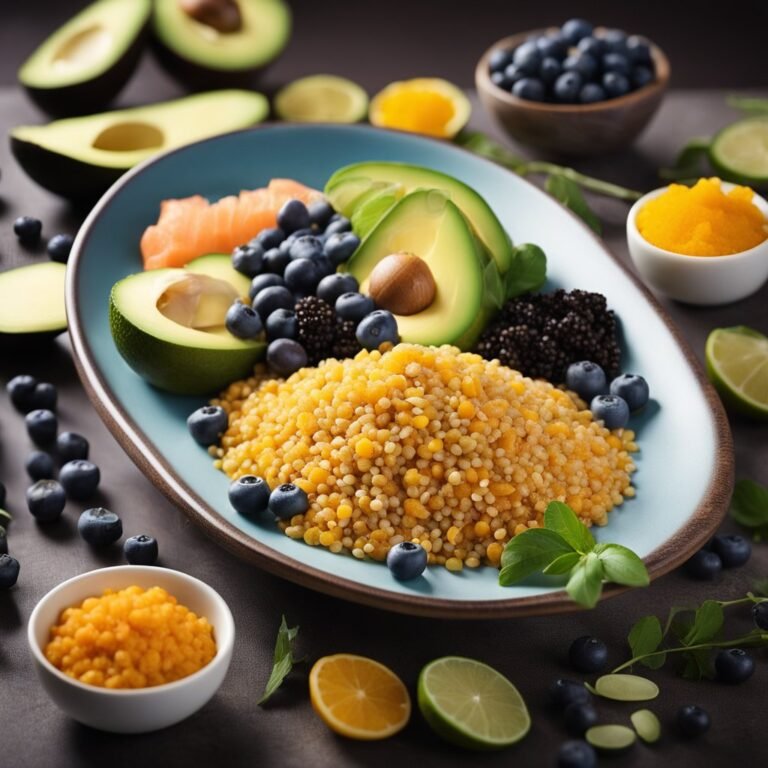Maintaining a healthy and well-balanced diet is essential for our health and well-being. With so many options available, it can be overwhelming to decide which foods to include in our daily meals. However, certain foods stand out above the rest when it comes to their nutritional value; these are known as superfoods.
Superfoods contain essential vitamins, minerals, antioxidants, and other nutrients, providing numerous health benefits. Including them in your diet can not only improve your physical health but also boost your immune system and prevent chronic diseases.
This article will discuss seven superfoods you should consider incorporating into your diet for a healthier and happier life.
1. Blueberries
Blueberries are one of the most popular superfoods, and it’s easy to see why. These small but mighty berries are rich in antioxidants, specifically anthocyanins, which give them their deep blue color. Antioxidants help protect our cells from damage caused by free radicals, unstable molecules that can contribute to aging and diseases such as heart disease and cancer.
Did you know blueberries are not just delicious but also packed with fiber, vitamin C, and manganese? They’re a tasty way to boost your health. They have been linked to improved brain function, lower blood pressure, and reduced risk of heart disease. You can easily incorporate blueberries into your diet by adding them to your smoothies and oatmeal or enjoying them as a snack.
2. Avocado
Avocados have become increasingly popular due to their creamy texture and delicious taste. But they offer much more than just flavor – they are a powerhouse of nutrients. Avocados are a great source of healthy fats, including monounsaturated and polyunsaturated fats, which can help lower cholesterol levels and reduce the risk of heart disease.
They are also high in fiber, potassium, vitamin C, and folate. Avocados have been linked to improved skin health, reduced inflammation, and even weight loss. You can incorporate avocados into your diet by making guacamole, adding slices to sandwiches or salads, or using them as a topping for toast.
3. Salmon
Salmon is considered one of the healthiest fish you can eat due to its high concentration of omega-3 fatty acids. These essential fatty acids play an important role in brain function and have been linked to a reduced risk of heart disease, depression, and Alzheimer’s.
Salmon is also a great source of protein, vitamin B12, and potassium. For optimal health benefits, it is recommended to consume at least two servings of fatty fish per week. For a tasty and healthy meal, you can enjoy salmon grilled, baked, or even in sushi form.
4. Kale
Kale has gained popularity as a superfood due to its high nutrient content and numerous health benefits. This leafy green is packed with vitamins A, C, and K and antioxidants like beta-carotene and lutein.
Kale has been linked to improved bone health, reduced risk of heart disease, and lower blood pressure. It is also a great source of fiber and can be easily incorporated into your diet by adding it to salads, smoothies, or even making kale chips as a healthy snack.
5. Quinoa
Quinoa has been gaining popularity as a superfood in recent years due to its high protein content and numerous health benefits. This ancient gluten-free grain contains all nine essential amino acids, making it a complete protein source for vegetarians and vegans.
Quinoa is also high in fiber, magnesium, potassium, and iron. It has been linked to improved digestion, reduced inflammation, and even weight loss. You can incorporate quinoa into your diet by using it as a substitute for rice or pasta, adding it to salads, or making quinoa bowls with your favorite toppings.
6. Turmeric
Turmeric is a spice commonly used in Indian and Asian cuisine. It is known for its distinct yellow color and pungent flavor. It has this active compound called curcumin, which packs some serious anti-inflammatory benefits.
Turmeric has been linked to numerous health benefits, such as improved brain function, reduced risk of heart disease and cancer, and even potential anti-depressant effects. You can add turmeric to your meals by using it as a spice in cooking or making golden milk – a traditional Ayurvedic drink made with turmeric and milk.
7. Chia seeds
Chia seeds are small but mighty superfoods that have gained popularity in recent years due to their high nutrient content and numerous health benefits. These tiny black seeds are rich in fiber, omega-3 fatty acids, calcium, and magnesium.
They are associated with enhanced digestion, better heart health, and even weight loss. You can incorporate chia seeds into your diet by adding them to smoothies and oatmeal or making chia pudding for a healthy breakfast or snack option.
Conclusion
Incorporating superfoods like blueberries, avocados, salmon, kale, quinoa, turmeric, and chia seeds into your diet is a simple yet effective way to enhance your health and well-being. Each of these foods offers a unique combination of essential nutrients and health benefits, contributing to improved physical health, better immune function, and reduced risk of chronic diseases.
By making these nutritious options a staple in your meals, you empower yourself to live a healthier lifestyle. Always choose whole, unprocessed options and listen to your body’s needs for optimal results.
FAQs About Superfoods
What are superfoods?
Superfoods are nutrient-packed foods that are really great for your health and well-being. They are typically packed with vitamins, minerals, antioxidants, and other compounds that may contribute to better health and disease prevention.
How can I incorporate superfoods into my diet?
Incorporating superfoods into your diet can be effortlessly achieved by including them in your meals. For example, you can mix berries into your morning oatmeal, toss kale into salads, use quinoa as a base for grain bowls, or blend spinach into a smoothie.
Are superfoods expensive?
While some superfoods can be more expensive than standard fruits and vegetables, many are quite affordable. For instance, items like beans, sweet potatoes, and whole grains such as brown rice can provide numerous health benefits without breaking the bank.
Can I eat superfoods every day?
Yes, many superfoods can and should be included in your daily diet. Rotating different superfoods will provide a broader range of nutrients while keeping your meals interesting. It’s essential to maintain a balanced diet incorporating various food groups.
Are there any side effects of eating superfoods?
Most superfoods are safe and healthy for most people when consumed in moderation. However, some individuals may have allergies or intolerances to specific superfoods. If you have any concerns or underlying health issues, it’s recommended that you consult with a healthcare provider.
Do I need to buy organic superfoods?
While organic superfoods are often preferred for their environmental benefits and lower pesticide footprint, it’s not always necessary. Conventional produce can also offer significant health benefits. Focus on including a variety of fresh fruits, vegetables, and whole foods in your diet.
Can superfoods prevent diseases?
While no single food can guarantee disease prevention, many superfoods are linked to health benefits that may reduce the risk of certain chronic diseases. A balanced diet rich in superfoods, regular physical activity, and a healthy lifestyle can contribute to overall well-being.
How do superfoods fit into a weight loss plan?
Superfoods can be great allies in a weight loss plan. Many are low in calories but high in nutrients and fiber, which can enhance feelings of fullness. Incorporating superfoods like salads, grilled salmon, and quinoa can help satisfy cravings while supporting overall health.

